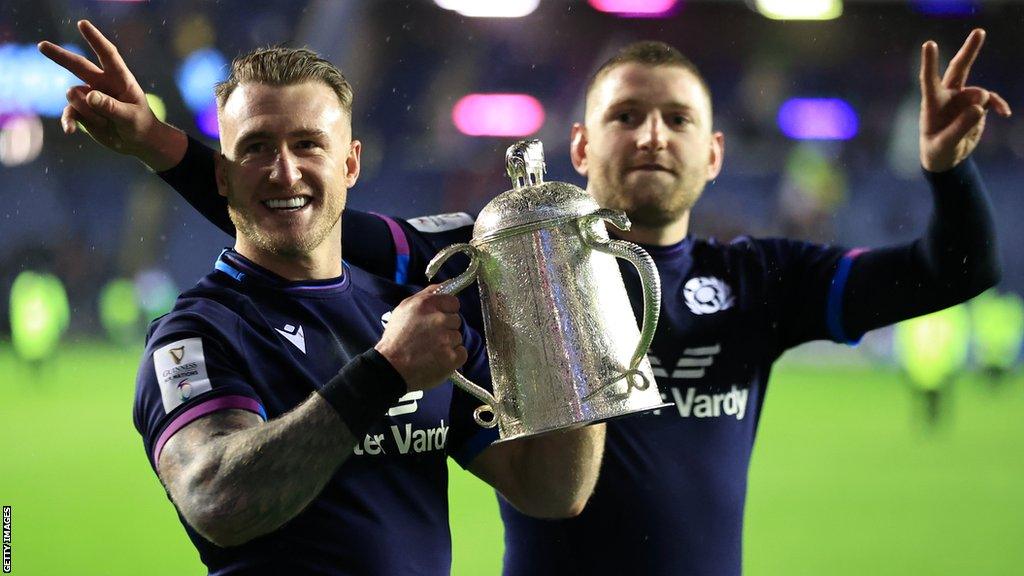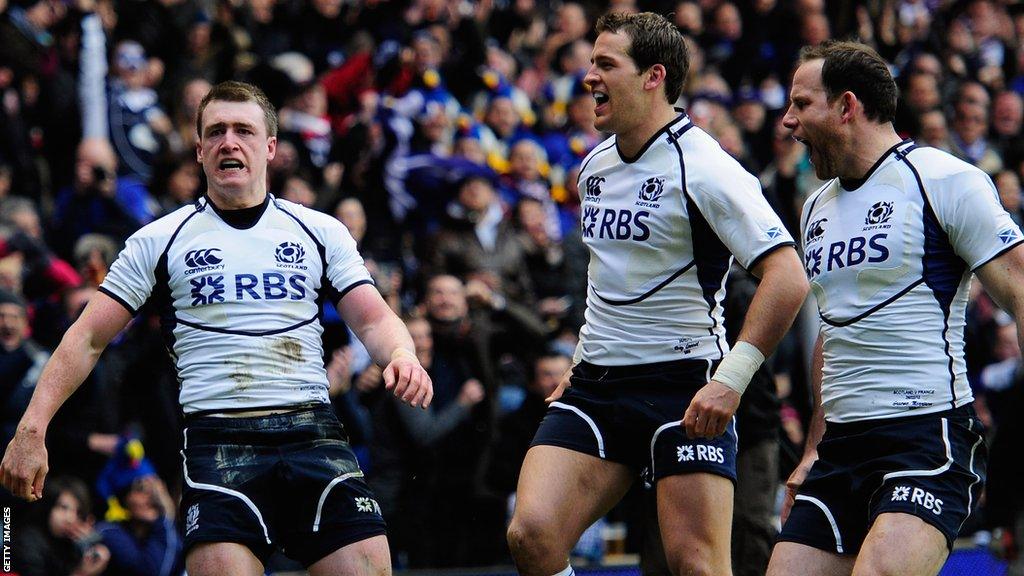Stuart Hogg profile after Scotland & Lions full-back plots end of career
- Published
- comments

Hogg celebrates a Calcutta Cup win with Finn Russell, Scotland's other superstar back
Stuart Hogg has sprung many surprises on many unsuspecting defences in his time, but in announcing that he's retiring from rugby after the World Cup later this year he delivered a wow-factor moment to rank with any other in his 13-year Test career.
Like a bemused victim of his footwork and his pace, nobody saw this coming. The wear and tear on his body is the reason and it makes sense. A hundred caps and hundreds more club games on top over so many years take their toll.
He's only 30 and will be 31 by the time the World Cup swings around. That's not especially old - not in the era of a 37-year-old Johnny Sexton still tearing it up at the highest level - but Hogg is calling it early. He could probably carry on, but knows in his heart that he'd be a diminishing force and he doesn't want that. He knows he's physically not able to go on much longer. There's honesty in what he's done. And a lot of class.
Hogg is a compelling character. There are two Hoggs in many ways. There's the Hogg who appears in a room full of journalists with his guard up and his antennae twitching - and there's the Hogg you encounter in a different setting. One to one, he's a complex individual.
He came into the international scene as a 19-year-old in a team that couldn't attack their way out of a paper bag. He went on to become one of the most talented players the nation has ever produced, a fascinating amalgam of sensitivity and resilience, with deep sadness in his story. You can't catalogue Hogg's life and times without revisiting the night it could have all come to a tragic end.
He's been asked many times about the car accident that claimed the life of his friend Richard Wilkinson, how the two of them played rock, paper, scissors to see who got to sit in the front passenger seat, how the driver of the car got involved in a race, how the car overturned at 90mph and how Wilkinson died while Hogg, in the back seat, survived.
"At that age, you think you're invincible, don't you?" he says.
Listening to Hogg speak, you suspect there are depths to that awful experience and how it impacted on him that only those closest to him will know.
He's got Wilkinson's initials tattooed on his ribs. He does a W sign to the heavens every time he scores a try - and there's been 27 of those for Scotland, a record. He's spoken about how he wants to bring his friend with him on his journey and this is the only way he knows how. Richard Wilkinson has gone but in Hogg's mind, in a sense, he's never left.
Hogg was capped for the first time less than three years after the accident. A lightning quick full-back with brilliant footwork, a sumptuous offloading game and a huge menace as a try scorer, he was greeted with awe by Scottish fans because they hadn't seen anyone like him in an age.

Hogg scores his first try for Scotland, against France in 2012, with his longevity illustrated by Rory Lamont (middle) and Graeme Morrison - players from a different era - being the first to congratulate him
Scotland's attack had been stultifyingly dull. In the four Six Nations championships before his debut, they'd failed to score a try in 50% of their games. They averaged 0.8 of a try per Six Nations Test in that run.
Hogg was a genuine rugby rock star. Scotland's first of the professional age. It would be another three years before Finn Russell played his first Six Nations match. For every minute of those three years the creative burden rested pretty much on Hogg and nobody else.
He brought adventure and skill. He offered hope. He was a Lion at 20. In 2016 and 2017 he won back-to-back Six Nations player of the championship awards as voted for by the public (Brian O'Driscoll is the only other player to have done that).
There are layers to him. A bravado and a vulnerability. The way he talks about his younger self in the wake of that first Lions tour as a kid in 2013 is severe. He said he let the selection go to his head, got too big for his boots, thought he'd out-grown his club, Glasgow Warriors, and angled for a move to Ulster. His Glasgow coach, Gregor Townsend, dropped him for the Pro12 final against Leinster as a result of his petulance. "I was sitting in the stand with a pint. It was rubbish and all my own doing."
What makes him fascinating is the twin sides of his personality. He is fond of his public image - the hair, the teeth, the wedding pictures in Hello magazine, - but when you get him talking, the barriers come down and somebody altogether more real emerges.
Getting invalided out of the 2017 Lions tour caused him untold angst. "It absolutely killed me," he said.
He fractured his cheekbone, then had his shoulder reconstructed, then tore a muscle in his gut, then did his shoulder again. In two years he played 19 games for Glasgow. Then there was his dalliance with social media as this was developing.
"The problem is me being the person I am is that I listen to what people have to say. I could get 99 brilliant comments and one person will abuse me and that will be one that I focus on," he said a few years back.
"I know there are a lot of people who'll go in the changing room after a match and search for their name on social media. I was really bad for that. I was listening to all these external voices and trying to prove them wrong. I was trying too hard, too uptight and it got worse and worse and the love of the game was gone."
Six Nations: Stuart Hogg scores amazing try for Scotland
How many sports people speak about their own frailties in that way? When Leinster knocked Exeter out of the Champions Cup in 2021, Hogg said that he played "like an absolute clown". The self-analysis, at times, has been more brutal than any pundit could muster on their angriest day.
There's been turbulence, but there's been glory. A Magners League win with Glasgow in 2015, a European Cup and Premiership double with Exeter in 2020, three Lions tours, captain of his country on the day they broke an 18-year hoodoo when winning in Wales, captain again when they won in Paris for the the first time in 22 years, captain once more when they conquered Twickenham for the first time in 38 years.
The loss of the Scotland captaincy last year is just another dimension. Hogg and five others went out drinking in Edinburgh on a Saturday night when they should have been back at camp preparing for the trip to Dublin a week later.
As captain, the criticism alighted on Hogg (and Russell). His truculent post-match press conference did him no favours. In a less confrontational setting, Hogg might have handled it a whole lot differently.
He has been quietly effective rather than barnstormingly brilliant this season. Blair Kinghorn has been excellent off the bench, a ready-made replacement in the post-Hogg era.
What has always been obvious from the start is his deep love of Scotland and the pride he feels when playing for his country. This is all he's ever wanted to do and be.
He has one last hurrah in France. It's going to be brutally hard, but for everything he has done, he deserves a thunderous farewell.

Simply Red's live performance at Maida Vale: Listen to all-new versions of their biggest hits and a surprising cover
Searching for new converts in Manchester: The Mormons Are Coming follows young missionaries during their make-or-break training
